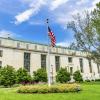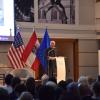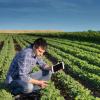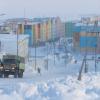
The National Academy of Sciences is one of the founding members of IIASA. The membership contribution for the US is supported by the National Science Foundation. The American Academy of Arts & Sciences served as NMO from 1982 until 2003.
Friends of IIASA (FoI) is a US-based non profit organisation that aims to foster and support research at and in cooperation with IIASA and the US research community and in close collaboration with the US NMO.
 © IIASA
© IIASA
IIASA Connect
Are you a member of our USA regional community? IIASA Connect is our exclusive platform bringing this network together. Join today!
News

14 June 2024
IIASA Leadership visits Washington DC

13 June 2024
Professor Karen Lips appointed as IIASA Deputy Director General

23 April 2024
US Permanent Representative to International Organizations in Vienna visits IIASA
Events
Embassy of Austria, 3524 International Court Northwest Washington, DC 20008 United States
John Schellnhuber lecture at Austrian Embassy in Washington D.C.
Focus
27 June 2024
Redefining pandemic impact: conventional estimates overstate COVID-19 life expectancy losses tenfold

08 November 2023
Adopting new strategies for fighting soybean failures in the Americas

Projects
Publications
Ton, M.J., de Moel, H., de Bruijn, J. , Botzen, W.J.W., Karabiyik, H., Friedrich, M., & Aerts, J.C.J.H. (2024). The impact of natural hazards on migration in the United States and the effect of spatial dependence. Journal of Environmental Planning and Management 1-19. 10.1080/09640568.2024.2359447. Marois, G. , Gietel-Basten, S., Crespo Cuaresma, J., Zellmann, J.G., Reiter, C. , & Lutz, W. (2024). Measuring Human Capital with Productivity-Weighted Labor Force: Methodology and Projections for China, India, the United States, and the European Union. IIASA Working Paper. Laxenburg, Austria: WP-24-005 Wu, G.C., Baker, J.S., Wade, C.M., McCord, G.C., Fargione, J.E., & Havlik, P. (2022). Contributions of healthier diets and agricultural productivity toward sustainability and climate goals in the United States. Sustainability Science 18 (1) 539-556. 10.1007/s11625-022-01232-w. Yangji, G. (2022). Future scenario of residential hourly cooling energy demand in the United States. IIASA YSSP Report. Laxenburg, Austria: IIASA Jiang, Z., Zhu, R., Miyazaki, K., McDonald, B.C., Klimont, Z. , Zheng, B., Boersma, K.F., Zhang, Q., Worden, H., Worden, J.R., Henze, D.K., Jones, D., Denier van der Gon, H., & Eskes, H. (2022). Decadal Variabilities in Tropospheric Nitrogen Oxides Over United States, Europe, and China. Journal of Geophysical Research: Atmospheres 127 (3) e2021JD035872. 10.1029/2021JD035872. Funk, J., Forsell, N., Gunn, J., & Burns, D. (2022). Assessing the potential for unaccounted emissions from bioenergy and the implications for forests: The United States and global. GCB Bioenergy 14 (3) 322-345. 10.1111/gcbb.12912.
